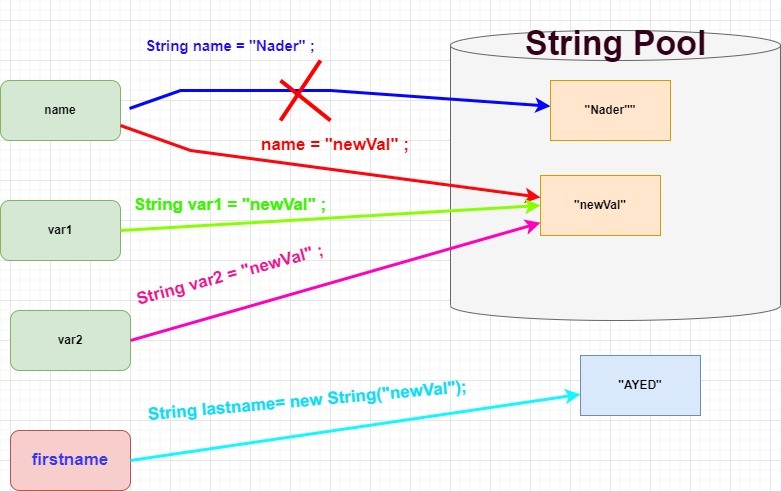Why Are Strings Immutable in Java? Trick Reasons and Benefits Clarified
Why Are Strings Immutable in Java? Trick Reasons and Benefits Clarified
Blog Article
What Is Unalterable Strings and How It Functions
In the world of programming, recognizing the principle of immutable strings is vital for producing durable and secure applications. Unalterable strings refer to strings that can not be altered after they are created, ensuring information honesty and predictability within the code.
The Fundamentals of Immutable Strings
Immutable strings, as a basic idea in programs, are character sequences that can not be transformed as soon as they are produced. This indicates that as soon as a string is designated a value, that value can not be modified. In languages like Python and Java, strings are unalterable things, leading to different ramifications in regards to memory monitoring and data honesty.
Among the vital benefits of unalterable strings is that they give a complacency in data adjustment. Considering that the content of an immutable string can not be modified, it guarantees that the original data stays intact, reducing the risk of unplanned adjustments throughout program execution (Why are strings immutable in Java?). This property also streamlines debugging processes, as programmers can rely on that when a string is specified, its worth will certainly not be inadvertently altered
When a new string is created based on an existing one, rather than changing the initial string, the brand-new worth is saved independently. On the whole, recognizing the fundamentals of unalterable strings is critical for understanding programming ideas and enhancing code effectiveness.
Benefits of Unalterable Strings
Building upon the safety and security and efficiency advantages of immutable strings, their advantages reach boosting code reliability and streamlining concurrent programs jobs. By being immutable, strings can not be customized after creation, which removes the danger of unintentional modifications in the data they store. This integral immutability makes sure that when a string is produced, its worth remains continuous throughout the program's execution, minimizing the chances of pests caused by unanticipated changes.
Additionally, unalterable strings add to code dependability by making it simpler to reason regarding the state of a program. Since strings can not be transformed, designers can rely on that a string will constantly hold the same value, simplifying debugging and maintenance efforts. This predictability leads to extra stable and trustworthy codebases.

Execution in Programming Languages
Within various programming languages, the unification of immutable strings is a fundamental facet that influences exactly how information is dealt with and controlled within code frameworks. The application of unalterable strings varies across various shows languages, with each language using its own devices to support this principle.

In comparison, languages like C and C++ do Clicking Here not have integrated assistance for immutable strings. Developers in these languages need to manually carry out immutability by implementing rules within their code to avoid direct alterations to string things.
Finest Practices for Collaborating With Unalterable Strings
When dealing with unalterable strings in programs languages like Java and Python, sticking to finest practices makes sure effective and protected information adjustment. One of the essential finest methods is to use StringBuilder or StringBuffer as opposed to straight manipulating strings, especially when dealing with considerable concatenation procedures. These courses offer mutable alternatives for string manipulation, assisting to prevent unneeded memory allowances and boosting performance.
In addition, when functioning with delicate data such as passwords or API secrets, it is essential to avoid keeping them as simple text in immutable strings. Utilizing safe storage space mechanisms like char arrays or specialized libraries for handling delicate details assists mitigate safety dangers linked with immutable strings.
Real-world Applications and Instances
Checking out functional applications of unalterable strings in different industries exposes their considerable influence on information stability and system dependability. In the health care industry, immutable strings play an essential duty in ensuring the safety and security and confidentiality of patient data. By protecting against unauthorized alterations to delicate information such as medical records and prescriptions, immutable strings aid preserve compliance with stringent privacy policies like HIPAA.
Banks likewise profit from the immutable nature of strings to improve the safety of client great post to read information and transaction documents. Unalterable strings help protect against fraud and unapproved alterations to economic information, offering a robust defense versus cyber hazards and ensuring the trust and confidence of customers.

Final Thought
Ideal techniques for functioning with unalterable strings include staying clear of direct alterations and utilizing approaches that return new string items. Real-world applications of unalterable strings include data file encryption, caching, and string manipulation tasks.
Unalterable strings refer to strings that can not be changed after they are produced, guaranteeing information honesty and predictability within the code. When a new string is created based on an existing one, rather than changing the original string, the new value is kept individually.In languages like Java and Python, strings are immutable by default, indicating that as soon as a string things is created, its value can not be altered - Why are strings immutable in Java?. Ideal techniques for working with unalterable strings consist of avoiding direct adjustments and utilizing methods that return new string items. Real-world applications of unalterable strings consist of data file encryption, caching, and string adjustment tasks
Report this page